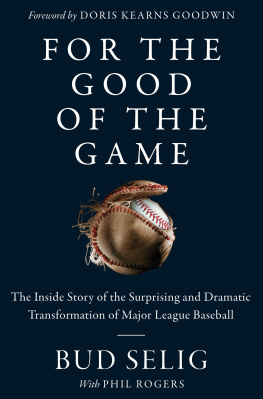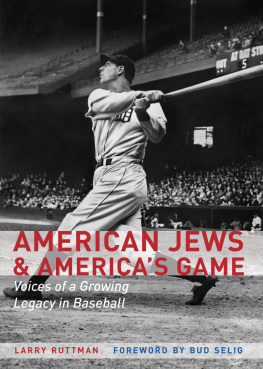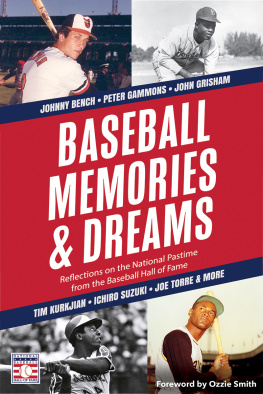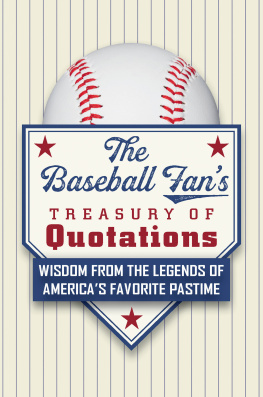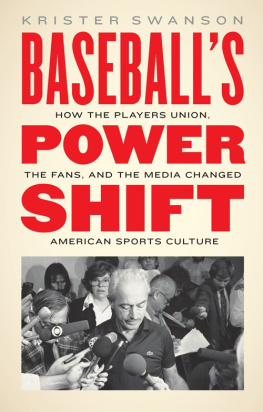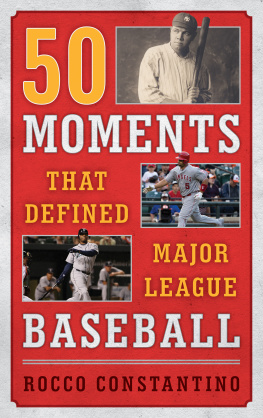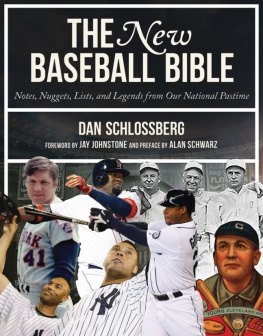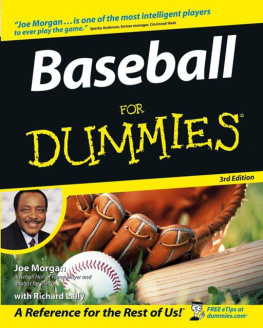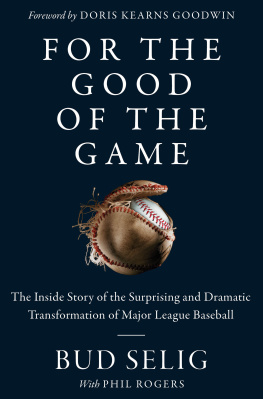Contents
Guide
To my mother and father, and
everyone who made this journey possible
Contents
H ISTORY AND BASEBALLTWO of my earliest and enduring passionsare the building blocks of this heartfelt memoir by Bud Selig. I first met Baseball Commissioner Bud Selig twenty years ago when I was in Milwaukee to deliver a lecture on one of Buds heroes, Franklin Roosevelt. Every time we have seen each other since, there has been a happy contest between my desire to talk baseball and his to talk history. So how delighted I am to write the foreword for this memoir that serves both as a work of history and a riveting account of baseball during a fraught and transformative time.
Buds love of baseball was ignited (as in my case) by a parents devotion to the game. He was only three when his mother, Marie, an immigrant from Ukraine, began taking him to the park where the minor league Milwaukee Brewers played. Then, during weekends and summer breaks, she arranged magical field trips to Comiskey Park, Yankee Stadium, Ebbets Field, and the Polo Grounds. An intuitive storyteller with a keen memory for the telling detail, Bud recalls a game at Yankee Stadium on his fifteenth birthday. To his glee, a big cake was rolled onto the field before the game began. Bud thought that his omnipotent mother had somehow managed to arrange the celebration just for him. In actuality, the cake marked manager Casey Stengels birthday.
After Bud graduated from the University of Wisconsin and joined his fathers car dealership, baseball became not merely an avocation, but the essence of his life. When the Milwaukee Braves stunned the city and state by announcing a move to Atlanta, Selig and a small group of business and civic leaders fought to give Milwaukee a second chance at baseball. It took five years to put the money together and gain acceptance from Major League Baseball, but the group was finally able to purchase the bankrupt Seattle Pilots and bring the team to Milwaukee. In honor of the minor league team that had been Buds first love, they were rechristened the Milwaukee Brewers.
The story of the realization of a new park for the BrewersMiller Park named for the Miller Brewing Companyis one of intense political drama. After months of struggle with the governor and the legislature, the financing plan was passed by the State Assembly but lacked the votes to survive in the State Senate. The package called for a sales tax in the four-county area that included Milwaukee. After George Petak, the senator from neighboring Racine County announced his support for the legislation, his fellow legislators insisted on adding his county to the four that would be taxed. On behalf of his own county, Petak initially felt compelled to vote no. In the middle of the night, however, he reversed his vote and the bill passed 16-15. Petak knew he would face a political firestorm, but believed a thriving baseball team would benefit all Wisconsin and didnt believe there was any other way to keep the team in the state. That firestorm was not long in coming. Residents in Racine County forced a recall vote and Petak was voted out of office. To this day, George Petak remains a hero to Bud Selig and to all fans of the Milwaukee Brewers.
Watching the Brewers from the owners seat, Selig acknowledges, was both exhilarating and agonizing. Like so many rabid fans, Bud is superstitious. When the game was tight in the late innings, he followed a seven-minute rule. He would leave his seat and pace the hallway, hiding behind a girder. There, he could figure out what was happening by the cheers or groans. For some reason he found it less painful to hear what was happening than to actually watch the action. Unless, of course, the cheers rose in volume and then he could race back to his seat!
When Bud Selig was selected by his fellow owners as acting commissioner and then baseball commissioner, a post he would hold for twenty-two years, the game he loved was in drastic jeopardy. He recognized, he writes, that a sport resistant to change had to change, if it was going to survive, much less thrive. The gap between the big- and small-market clubs was widening at an alarming rate. The same few teams made it to the playoffs year after year, dampening the hopes and attendance of fans in dozens of other cities. In these same troubled years an unprecedented, literally unbelievable number of home runs were being hit. Something more than new workout equipment, smaller ballparks, or dilution of pitching talent because of an expanded number of teams was at play here.
This memoir takes us through each of these significant struggles with vivid detail that enlivens the main characters involvedincluding the emotional, combustible Yankee owner, George Steinbrenner; the L.A. Dodgers Walter OMalley, forever a despised figure in Brooklyn, and in Seligs opinion, a leader more concerned with himself and the fortunes of his own team than the good of the game; the unions bleeping Marvin Miller, who, Selig believes (despite the immense power he wielded in his fights with the owners), belongs in the Hall of Fame; and Henry Aaron, a giant on and off the field, and Seligs close friend for sixty years.
Indeed, the first chapter recounts the agony Bud experienced when Barry Bonds, a suspected steroids user, was closing in on Hank Aarons career home run title of 755 homers. As commissioner, he felt obligated to hopscotch around the country to witness the moment when Bonds hit the homer that would make historyalbeit a contaminated milestone.
The watershed process of dealing with steroids in baseball was long and torturous. For years, the players union adamantly refused to allow drug testing, even as the integrity of a game built upon records and statistics was put into question. After much foot-dragging, a series of events finally led to slow progress. A dramatic home run race between Mark McGwire and Sammy Sosa captured the attention of the nation but stoked fresh questions about the sudden increase in their prodigious number of home runs. A few years afterward, players and owners agreed to an anonymous drug testing program and when the tests were conducted, between 5 and 7 percent of the players tested positive. Not long after, four people associated with the game were charged in a 42-count federal indictment of running a steroid-distribution ring that provided performance-enhancing drugs to dozens of athletes. Contentious congressional hearings on steroid use commenced.
Selig persuaded former Senate majority leader George Mitchell to conduct an investigation. Two years in the making, the Mitchell Report gained access to steroid suppliers and accused nearly a hundred players of using steroids. Polls showed that, despite the unions refusal, 79 percent of the players wanted to be tested. Finally, a testing program with harsh punishments for transgressions was put in place. Though it came too late to preserve the record of the great Henry Aaron, baseballs testing program soon became the strongest in any major American sport.
Progress in creating competitive balance was hamstrung from the start by the unions flat refusal to consider a salary cap similar to that in the NFL or the NHL. (This was the issue surrounding the longest strike in baseball history and the cancellation of the 1994 World Series.) Attendance and enthusiasm for the game dropped dramatically. Selig knew that major change had to take place. When he first introduced the idea that big-market teams share some of their greater revenue with small-market teams, however, emotions flared so high that it seemed nothing would get done. But over time, under Seligs patient, yet unrelenting, and ultimately transformative leadership, the owners agreed to both revenue sharing and a luxury tax, bringing an unmatched level of parity to the game.
For the opportunity for a greater number of teams to reach the playoffs, however, additional changes were necessary. Selig proposed that the traditional two divisions be restructured into three and that a wild card (and eventually two wild cards) be added. The proposition met with strong criticism from the media, but Selig brought all the owners aroundwell, almost all. The final vote was twenty-nine in favor, one opposed. The no vote was cast by Texas Rangers owner George W. Bush, a traditionalist who did not want to tamper with the structure of the game. While criticism from purists remains, the wild card has proved wildly popular. With the help of playoff expansion, revenue sharing, and the luxury tax, Selig proudly notes, all thirty teams played postseason baseball during his tenure, and twenty different teams reached the World Series!

